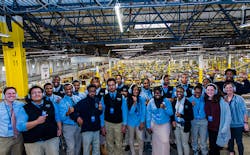FIRST (For Inspiration and Recognition of Science and Technology) was founded by Dean Kamen in 1989 to inspire an appreciation of science and technology in young people. Based in Manchester, N.H., FIRST designs accessible, innovative programs to build self-confidence, knowledge, and life skills while motivating young people to pursue opportunities in science, technology, and engineering. With support from over 200 of the Fortune 500 companies and more than $80 million in college scholarships, the not-for-profit organization hosts the FIRST Robotics Competition for students in Grades 9-12; FIRST Tech Challenge for Grades 7-12; FIRST LEGO League for Grades 4-8; and FIRST LEGO League Jr. for Grades K-4
"Amazon is helping FIRST in our goal to make robotics teams and programs available in every school,” said Kamen, who is also president of DEKA Research & Development. “In FIRST, every kid on every team can go pro. They gain a hands-on learning pathway in technology, computer science and engineering that propels them forward and inspires innovation."The 100 schools across 21 states will receive support to launch FIRST robotics teams, including teacher professional development to learn about robotics, $10,000 from Amazon to expand access to computer science education in their school, and a tour of a local Amazon fulfillment center.
The Bureau of Labor Statistics projects that by 2020 there will be 1.4 million computer-science-related jobs available and only 400,000 computer science graduates with the skills to apply for those jobs. Computer science is the fastest-growing profession within the Science, Technology, Engineering and Math (STEM) field, but only 8% of STEM graduates earn a computer science degree, with a tiny minority from underprivileged backgrounds. Students from underprivileged backgrounds are 8 to 10 times more likely to pursue college degrees in computer science if they have taken AP computer science in high school.
The 100 schools across 21 states will receive support to launch FIRST robotics teams, including teacher professional development to learn about robotics, $10,000 from Amazon to expand access to computer science education in their school, and a tour of a local Amazon fulfillment center.
Data from a 5-year longitudinal study of FIRST by Brandeis University shows competitive FIRST robotics programs works for all youth. Across all demographic groups (gender, race, economic status and geography), FIRST students show significant gains in STEM knowledge, STEM interest, STEM career interest, STEM identity, and STEM activity compared to their peers who don’t participate.
FIRST students are more likely to major in tech-focused science fields in college; by their second year of college, over 50% declare majors in engineering or technology.
The impact on young women in FIRST is particularly profound. By their first year of college, female alumnae of FIRST are 3.6 times more likely to take an engineering course, and 1.9 times more likely to take a computer science course than female comparison students.
“Our students have been working incredibly hard over the course of their educational journeys to be in a position to take rigorous computer science courses, and this experience visiting the fulfillment center, as well as the support to expand our programming next year, is so empowering to them,” said Jake Kuhnline, Assistant Director of Teaching & Learning, KIPP Columbus in Columbus, Ohio. “It's rare that I hear a bus full of high schoolers talking about robotics, computer science, and the future of programming, but that trip generated that much enthusiasm.”
“The Amazon Future Engineer Robotics Grant is a game changer for middle and high school students throughout 53 KIPP schools around the country,” said Dave Levin, co-founder of KIPP Public Schools. “The generosity of Amazon will ensure more KIPP students than ever will have the opportunity not only to pursue successful careers in STEM, but help diversify the industry for future generations.”
Launched in November, 2018, Amazon Future Engineer is a four-part childhood-to-career program intended to inspire, educate, and prepare children and young adults from underrepresented and underserved communities to pursue careers in the fast-growing field of computer science. Each year, Amazon Future Engineer aims to inspire more than 10 million kids to explore computer science; provide over 100,000 young people in over 2,000 high schools access to Intro or AP Computer Science courses; award 100 students with four-year $10,000 scholarships, as well as offer guaranteed and paid Amazon internships to gain work experience. Amazon Future Engineer is part of Amazon’s $50 million investment in computer science/STEM education. In addition, Amazon Future Engineer has donated more than $10 million to organizations that promote computer science/STEM education across the country.
About the Author
IW Staff
Find contact information for the IndustryWeek staff: Contact IndustryWeek
